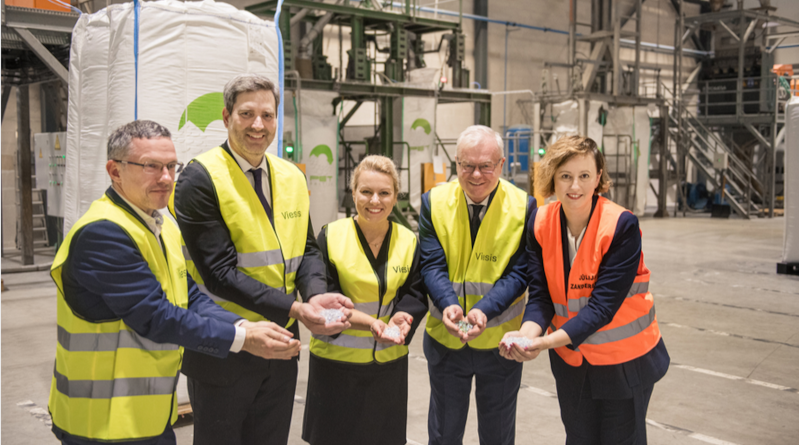One of the largest PET bottle processing plants in Northern Europe has been opened in Latvia
On October 23, the new factory of AS Iterum (formerly PET Baltija) was opened in Olaine – one of the largest in Northern Europe with a planned processing capacity of 80,000 t/a, or about 30% more than it was possible to provide at the company’s previous production facility in Jelgava. Iterum has invested more than 10 million euros in the creation of the new factory, while the total investment reaches more than 35 million euros.
Taking into account the goals of climate neutrality and the Green Deal set by the European Union (EU), the role of waste recycling is expected to significantly increase in its member states in the coming years. While the leading countries of the EU – Germany, Slovenia, Austria, the Netherlands, etc. – are able to recycle an average of 65% of generated waste, Latvia reaches less than 50% (according to Statista 2022 figures).
Jānis Irbe, parliamentary secretary of the Ministry of Climate and Energy, said: “In the implementation of circular economy principles, first of all, we are talking about the production of high-quality and long-lasting goods. Secondly, also about the use of raw materials obtained in the waste recycling process in its production. The circular economy model for the economy comes with challenges, but also opportunities to turn waste into raw materials that are in demand in the market. In the circular economy, the product’s harm to the environment and also to human health is reduced throughout the product’s life cycle – from the extraction of raw materials to production, packaging and transportation, all the way to the consumer. Not forgetting about waste recycling. The new production plant is a vivid example of how to turn waste into a valuable resource in the circular economy. The circular economy must become the basis of the European economy.”
Iterum’s newly opened factory will be one of the largest and most modern PET processing plants in Northern Europe and one of the largest industrial buildings in Latvia, with a total indoor area of approximately 30,000 m2 and an outdoor area of approximately 40,000 m2. The building complies with the sustainable construction standard Breem, it will fully use energy obtained from renewable resources. Wastewater treatment equipment, unique in Latvia, has been installed in the factory, which allows to reduce the consumption of chemicals in the process of wastewater treatment. An efficient air recuperation system has been created, which also provides that the excess thermal energy generated in the PET melting process will be used for heating the building. The new factory will have more than 250 jobs, with a special focus on employee well-being and the sustainability of the working environment.
Jūlija Zandersone, the chairman of the board of JSC Iterum, says that sustainability is one of the main pillars of the factory’s operation, while at the same time prioritising the quality of the final product, which the Latvian manufacturer can offer on the international market: “Almost 100% of our production is exported. The main sales countries are Lithuania, Germany, Finland, Poland and other regions of the world. Although Latvia is territorially small compared to other European countries, we can be proud that in terms of PET processing with high-quality production, we are able to reach up to 5% of this market share. We believe that the new Iterum factory is a new step for the further development of PET recycling, aiming to increase its market share even more.”
The Eco Baltia project was implemented with the support of INVL Baltic Sea Growth Fund and in cooperation with domestic industrial park developer SIA Piche. In turn, equipment suppliers are among the distributors of the most modern solutions, one of which is the Austrian manufacturer Starlinger. In Europe, equipment of this level has been installed in only two production plants.

